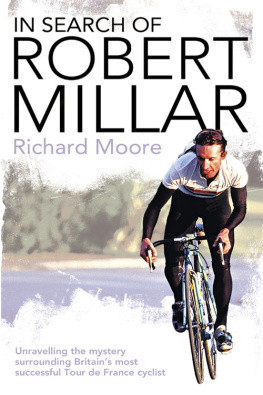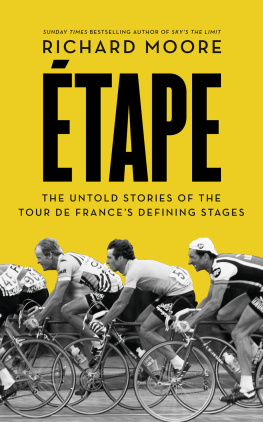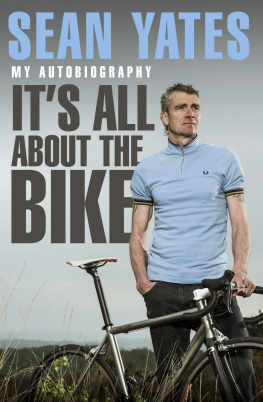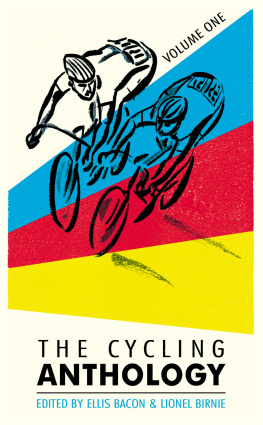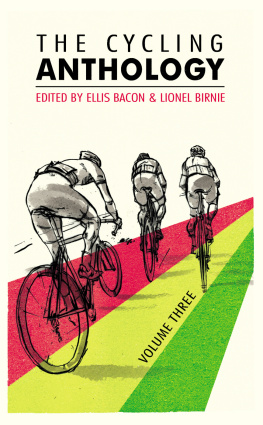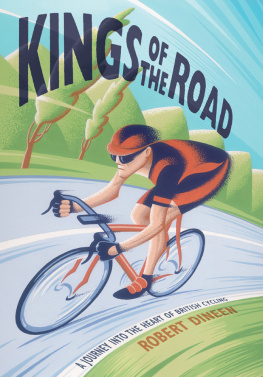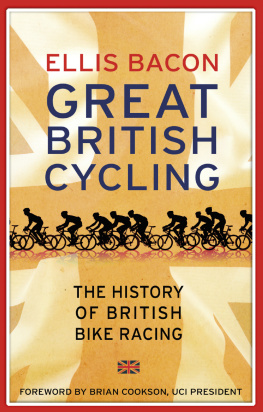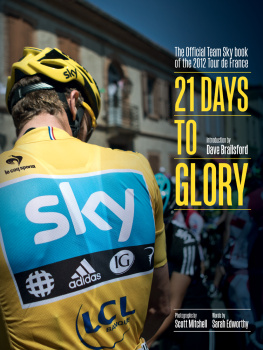SKYS THE LIMIT
WIGGINS AND CAVENDISH:
THE QUEST TO CONQUER
THE TOUR DE FRANCE
RICHARD MOORE

Contents
Theyll use technology that were all going to look at and go, Woah, I never saw that before.
Lance Armstrong
Rymill Park, Adelaide, 17 January 2010
Its a sultry hot summers evening in downtown Adelaide, and, at the citys Rymill Park, a large crowd begins to gather. Families line a cordoned-off rectangular 1km race circuit, around the perimeter of the park, while the balconies of pubs fill up with young people drinking beer out of plastic cups.
The road cycling season used to start six weeks later in an icily cold port on the Mediterranean, with the riders wrapped in many more layers than there were spectators. But the sport has changed in the last decade: it has gone global. And no event demonstrates that to the same extent as the season-opener: the Tour Down Under.
This year, though, there is another harbinger of change. Possibly. Wearing a neatly pressed short-sleeved white shirt, long black shorts and trainers, rubbing sun cream into his shaved head as he paces anxiously among the team cars parked in the pits area, is a man who bears more than a passing resemblance to a British tourist. Its Dave Brailsford.
In his native Britain, Brailsford has gained a reputation as a sporting guru. Since 2004 he has been at the helm of the British Cycling team, which, at the Beijing Games in 2008, he led to the most dominant Olympic performance ever seen by a single team. But that was in track cycling, not road cycling. Road cycling continental style is a whole new world, not just for Brailsford but for Britain, a country that has always been on the periphery of the sports European heartland.
There have been British professional teams in the past. But they have been, without exception, doomed enterprises, Icarus-like in their pursuit of an apparently impossible dream. The higher they flew to the Tour de France, as one particularly ill-fated squad did in 1987 the further and harder they fell. And the more, of course, they were burned in the process. In fact, it seems oddly fitting that after more than a century of looking in on the sport with only passing interest, and limited understanding, Adelaide in Australia, on the other side of the world, marks Brailsford and his new British teams bold entry into the world of continental professional cycling.
Bold is the apposite word. Everything about the new team, Team Sky from their clothing, to their cars, to the brash and glitzy team launch in London just days earlier screams boldness and ambition. They dont just want to enter the world of professional road cycling. They aspire to stand apart; to be different. And by being different, and successful, they aspire to change it, almost as the teams sponsor, British Sky Broadcasting, has changed the landscape of English football over the past two decades; almost as Brailsford and his team changed track cycling, not merely moving the goalposts, but locating them in a different dimension.
Team Sky is Brailsfords creation, along with his head coach and right-hand man, Shane Sutton. Sutton, a wiry, rugged, edgy, fidgety Australian, is the joker to Brailsfords with his background in business and his MBA straight man. They are as much a double act as Brian Clough and Peter Taylor, the legendary football management team. And similarly lost without each other. Here in Adelaide, an hour before the first race of the season, and the first of Team Skys existence, Sutton is missing. Brailsford keeps checking his phone and finally it beeps. The eagle has landed, reads the text message. Suttons delayed flight from Perth has arrived. Brailsford looks relieved. Well, Shane needs to be here for this, he says.
Sutton arrives. Has he brought champagne, ready to toast the occasion? Nah, none of that bullshit, he replies testily. He is wearing the same team-issue outfit as Brailsford; but if Brailsford looks like a businessman on holiday, Sutton, in his white shirt and long black shorts, has the mischievous, scheming air of a naughty schoolboy. Brailsford reaches into the giant coolbox parked in the shadow of the team car and pulls out a couple of cans of Diet Coke, tossing one at Sutton. They open their cans, take a swig, and wait for the action, which is just minutes away.
Brailsford has hurried back to Rymill Park from the teams hotel, the Adelaide Hilton, where he gave the seven Team Sky riders Greg Henderson of New Zealand, Mat Hayman and Chris Sutton of Australia, Russell Downing, Chris Froome and Ben Swift of Britain, Davide Vigan of Italy a pep-talk. Earlier, the riders had been presented on stage by the TV commentators, Phil Liggett and Paul Sherwen. I never thought Id see the day wed have a British team in the ProTour, said Sherwen. The ProTour is cyclings premier league of major events.
Though all experienced professionals, most of whom have competed for big teams, the seven Team Sky recruits find themselves riven with nerves as they prepare for their debut. The dead time between the presentation of the teams in the middle of Rymill Park and the start of the race acts as a black hole into which spill fears, doubts and anxieties. We were all nervous, just sitting around, waiting, Mat Hayman will recall later. Pulling on the new kit, being given this opportunity to be part of this new team We all know whats gone into this team: more than a years work, so much thought and organisation. Were excited about it, too, because weve all bought into what Dave and Shane and Scott [Sunderland, the senior sports director] are trying to do. And we all said that it had been a while since everyone had been so nervous about lining up.
Just before they left the hotel, to pedal the ten minutes to Rymill Park, Brailsford addressed them. This is a proud moment for me, he said. And its a unique occasion. Were only going to make our debut once. This is it, lads. Its a privilege. Enjoy it.
Brailsford had been in Adelaide for 48 hours ahead of the big kick-off, with Sunday evenings circuit race followed, two days later, by the six-day Tour Down Under. He had checked into the Hilton late on Friday evening and then wandered into the hotel lobby. Im a worrier, he said. I always worry. Im always wondering, what if wed done this, or that. Im sure thatll never change, but Im confident that weve done everything we could to prepare. Its a huge moment. Im excited. But he sought to add a note of caution. You cant go from having a group of individuals come together in Manchester to an elite team in six weeks, Brailsford pointed out. Its a process.
Despite the late hour, Brailsford drank a coffee, then another. And he kept talking, stopping only to yell at Matt White, the director of a rival team, Garmin-Transitions, as White walked through the lobby. Hey, Whitey! he yelled, though White didnt appear to hear him. Whitey!
Brailsford seemed out of his comfort zone, which, for several years, has been the centre of a velodrome, surveying his riders as they circle the boards of the track, talking to his coaches, in conference arms folded with Shane Sutton. With Team Sky, Brailsfords job title is team principal, which seems a bit vague (and, again, different ), other than in one important respect: hes the man with overall responsibility. But on the ground, during races, the sports directors will call the shots. Here in Adelaide the man in that role is one of the teams four sports directors, Sean Yates, an experienced British ex-professional; indeed, a former stage winner and wearer of the yellow jersey in the Tour de France. Yates has been overseeing the teams training all week in Adelaide.
It is clear that Brailsford, having just arrived, isnt quite sure yet of his role. This is not his world; not yet. He wants to focus, however, on the bigger picture; on the many races in the early part of the season, and the spring Classics, all leading up to Team Skys major target, the Tour de France, where they will be aiming to support their leader and homegrown talisman, Bradley Wiggins, in his bid for a place on the podium in Paris.
Next page

